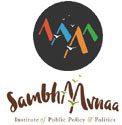UNDERSTANDING WATER AND WATER RESOURCES MANAGEMENT:
ISSUES, STRUGGLES AND SOLUTIONS
Date: 16-19 June 2014
Organisers: The Forum for Policy Dialogue on Water Conflicts in India ( www.waterconflictforum.og ) and the Sambhaavnaa Institute for Public Policy and Politics (https://www.sambhaavnaa.org/ )
Venue: Sambhaavnaa Institute, Palampur, H.P.
Theme: The theme of the workshop will focus on the crises around water and water resources management. It will highlight key issues of water as a common property resource– its exploitation, privatisation and the resulting impacts like conflicts around water and its access for the common people. The workshop will also focus on struggles and solutions for assertion of rights to this resource and redressal of the issues.
Eligibility : Young people working in the water sector. People who have just started working, want to start to work, or have been working in water related issues since 1-3 years. They could be activists in various sangathans, struggles, NGOs, they could be researchers doing M.Phil / Phd, lawyers working on water related cases, or could be media people wanting to report in this area.
Language: English and Hindi
Days: Four, with one day for field visit
Time: 16-19 June 2014, both inclusive
Suggested donation: 2500/-
[This fee covers the cost of lodging and boarding at the Institute, and training. Travel is to be borne separately by the participants. Need based full or partial fee waivers are available for students or individuals not associated with a formal organisations or who are full time activists. We can also consider, for very limited cases, offering travel support. Please indicate in the application form if you need fee waiver and/or travel support, along with explanation for the same.]
Application Timeline: To register for the workshop you can fill the form below by 30 th May, 2014. You can also fill in the attached form and send it to us at program@sambhaavnaa.org
Topics :
• Overview of Water Resources in India, and Key issues
• Socio-cultural and bio-physical dimensions of water
• Equity Dimensions in Water (Gender, Class, Caste)
• Dam struggles – General, Overview , Case Study from Assam of struggle against the downstream impacts of dams
• River Basin approach to dam struggle –solutions and struggle from Chalakudy Basin in Kerala
• Issues of pollution, flows, urban water – Struggle around the Yamuna river in Delhi and beyond
• Different types of water conflicts in India
• Privatisation and commodification of water
• Dencentralised Water Harvesting systems
Resource persons:
1. K.J. Joy, Pune: K. J. Joy has a Master’s degree in Social Work from the Tata Institute of Social Sciences, Mumbai. He has been an activist-researcher for more than 20 years and has a special interest in people’s institutions for natural resource management both at the grassroots and policy levels. His other areas of interests include drought and drought proofing, participatory irrigation management, river basin management and multi-stakeholder processes, watershed based development, water conflicts and people’s movements. He is the coordinator of the Forum for Policy Dialogue on Water Conflicts in India and is with Society for Promoting Participative Ecosystem Management (SOPPECOM), Pune.
2. Himanshu Thakkar, New Delhi: Himanshu Thakkar is a graduate engineer having obtained his B. Tech from IIT Powai, Mumbai. He was working as a fulltime activist in the Narmada Bachao Andolan for many years before setting up the South Asia Network on Dams, Rivers and People (SANDRP), which he coordinates now. He also edits its magazine, “Dams, Rivers & People”. He has been involved in issues related to water sector in India for over two and half decades, was earlier associated with the work of World Commission on Dams and Centre for Science and Environment.
3. Manoj Misra, New Delhi: Manoj Misra was formerly with the Indian Forest Service. He found the PEACE Institute(www.peaceinst.org). Presently, and since 2007 he has been the convener of Yamuna Jiye Abhiyaan (www.yamunajiyeabhiyaan.blogspot.in), a civil society consortium, working for the restoration of river Yamuna as an ecosystem.
4. Latha A, Thrissur: Dr. A. Latha, an Ashoka Fellow has a doctorate in Agriculture from the Kerala Agricultural University. She started her involvement in the field of environmental protection in the early 1990s which later evolved into research and information based campaigns amongst communities and local self-governments to conserve rivers in relation to dams, sand mining, pollution, deforestation etc. She has been the driving force behind the Chalakudy Puzha Samrakshan Samiti, the fight to save the Chalakudy river. Her areas of interest include, restoring E–flows in rivers, decentralised community led river basin management and restoration and watershed management.
5. Shripad Dharmadhikary, Pune: Shripad Dharmadhikary completed his graduation in 1985 with a Bachelor of Technology (B.Tech) degree from the Indian Institute of Technology (IIT), Powai, Mumbai. He was a full time activist of the Narmada Bachao Andolan for 12 years, before setting up the Manthan Adhyayan Kendra in 2001. Manthan is a centre set up to research, monitor and analyse water and energy issues. He is the coordinator of the centre. (www.manthan-india.org) . He is currently working on the issue of impacts and implications of current economic growth on water resources in India. His interests include water resources, water policy, rivers, dams, hydropower, irrigation, environmental flows, development and energy.
6. We are expecting to include a couple more resource persons from other parts of the country including North East.
Application Form: Click here to download form
Participation Form:
